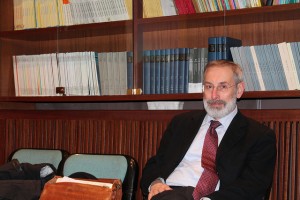LEADERS “A Prayer for Italy, without Straining the Truth”
Should Italian Jews incorporate a prayer for the welfare of the Italian Republic as it done in many synagogues in countries as in the United States, the United Kingdom and France? Participating in the annual convention of Italian Jewry organized by the Union of Italian Jewish Communities, the Chief Rabbi of France rav Haim Korsia passionately advocated for a movement in this direction. In the latest issue of Pagine Ebraiche, the Chief Rabbi of Rome Riccardo Di Segni offers his take on the matter.
“Indeed the question of the opportunity of the restoration of the prayer for Italy makes sense and should be discussed serenely,” writes rav Di Segni. “However, there is no need for Italian Jews to come up with ‘political’ prayers so that they can demonstrate who they are and what they feel. They are citizens with a complex and exclusive identity for whom the Italian part is still essential, deep and radical, in the same way their love for the land [of Israel] is.”
In his opinion piece, the Chief Rabbi of Rome explains the historical development of the prayer for the welfare and peace of the state, starting from the verse in Jeremiah (29:7) that reads “And seek the welfare of the city to which I have exiled you and pray to the Lord on its behalf, for in its prosperity you shall prosper.”
“Before my appointment as chief rabbi, the French army suffered great losses in Afghanistan. It was at that time that I suggested inserting a part dedicated to French soldiers in the prayer for the welfare of the Republic. I then decided that this prayer should be recited on all occasions and not only at public events. And it should be recited in French so that everyone would be able to understand it. Responding to my invitation were also many Muslim leaders who wrote a similar prayer. Maybe Italian Jews should do the same,” rav Korsia explained during his visit to Italy. “I understand that Fascism devastated Italy, the same way Vichy did to France. But isn’t it when someone is sick that you are supposed to pray even more intensely?”
For his part, rav Di Segni expressed the necessity of appropriateness and measure in everything. “It would be enough to avoid exaggerations such as putting up Israeli flags on Jewish buildings, or pictures of Italian or Israeli soldiers on the gates of our synagogue, it being understood our connection to Israel and solidarity to Italian soldiers.”
“In synagogues every prayer should be said because of the sense of shared duty and feelings and not for political opportunity. Let us have a beautiful and unostentatious prayer for this land and this state. However in this debate the French model does not help, considering that never as today the identity of French Jews has been sorely tried, and therefore there are people who feel the need to emphasize certain things that here it is neither required nor necessary to emphasize,” concludes the chief rabbi of Rome in the article. “Every country has its own history and sensitivity and in this matter the halakhic perspective is inevitably interwoven with the historical and political. Different models (and maybe strained interpretations) are not always applicable.”

